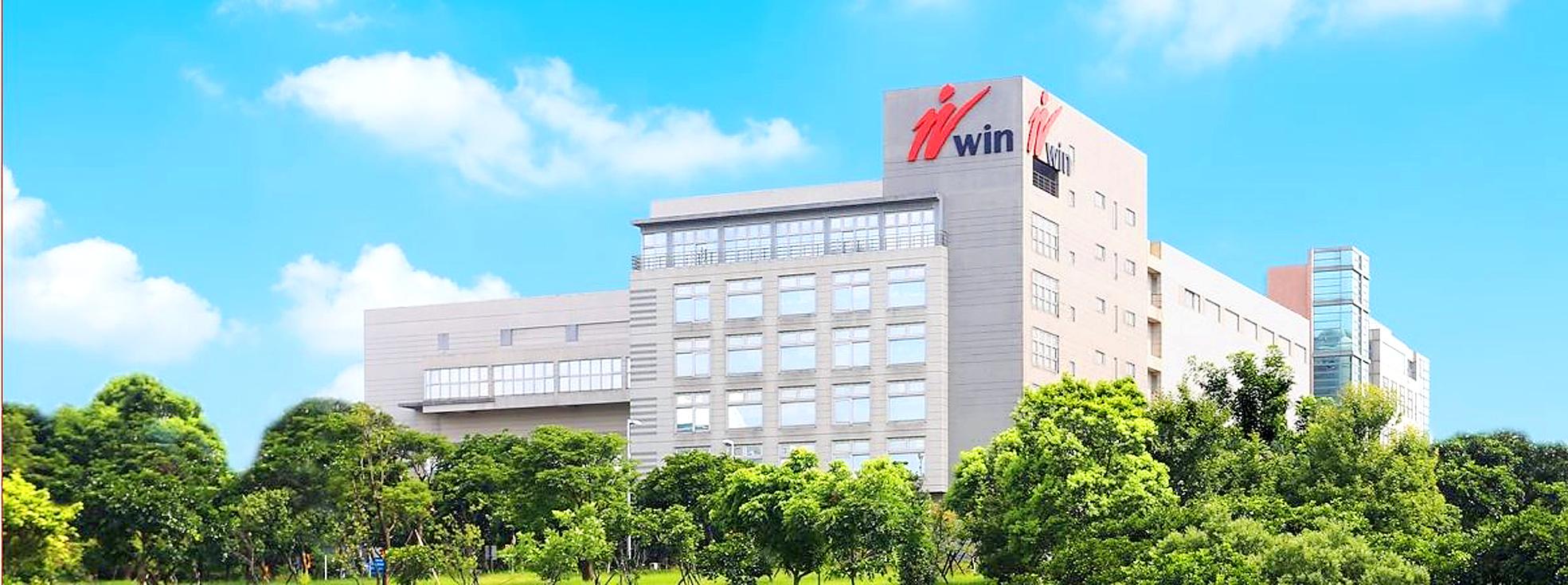Win Semiconductors Corp (穩懋半導體), the world’s largest pure-play gallium arsenide foundry, yesterday said it expects a low-teens percentage decline in revenue this quarter as demand from smartphones weakens during the slack season and unfavorable foreign-exchange rates continue to affect its top-line performance.
The company reported revenue of NT$6.86 billion (US$241.75 million) for October to December last year, with about 40 to 45 percent of that coming from power amplifiers for smartphones.
The Taoyuan-based company also said that some of its factories are entering annual maintenance this quarter, which would suggest a decline in wafer shipments and affect its revenue.

Photo: Screen grab from the Win Semiconductors Corp Web site
The company aims to retain its gross margin at about 35 percent this quarter, flat from last quarter, Win Semiconductor president Kyle Chen (陳國樺) told investors in a virtual conference.
The figure is the lowest in six quarters, as the appreciation of the New Taiwan dollar against the US dollar and an unfavorable product mix cut gross margin by 9 percentage points from 44 percent a year earlier.
For the whole of this year, Win Semiconductor still looks to expand its revenue to another record high from NT$25.55 billion reported last year, Chen said.
Higher 5G smartphone penetration and continued deployments of 5G base stations worldwide are expected to drive growth, he said.
Last year, about 20 percent of smartphone power amplifiers shipped by the firm were used in 5G smartphones and the figure is forecast to rise to 30 to 40 percent this year, he said.
The company is also bullish on the growth of its new gallium nitride-on-silicon carbide wafers for 5G base stations, as demand rose at an annual rate of 50 percent for a second consecutive year last year.
3D sensing components and light-detection-and-ranging applications would be another growth engine this year, thanks to increasing adoption of its vertical-cavity surface-emitting lasers (VCSEL) for light sources, Chen said.
The company’s VCSEL products are used in Apple Inc’s flagship iPhone 12 handsets to unlock the devices via facial identification, as well as for the back 3D camera for the first time to enhance picture quality, especially in low-light situations.
To cope with strong demand, Win Semiconductors last year expanded installed capacity at its factory in Taoyuan’s Gueishan District (龜山) by 5,000 wafers a month.
The company’s net profit last quarter plunged 31 percent to NT$1.28 billion, compared with NT$1.84 billion a year earlier. Last quarter’s figure was the weakest since the second quarter of 2019.
For the whole of last year, net profit soared 47 percent to NT$6.47 billion, compared with NT$4.4 billion in the preceding year. Earnings per share rose to NT$15.45, from NT$10.59.

AI SERVER DEMAND: ‘Overall industry demand continues to outpace supply and we are expanding capacity to meet it,’ the company’s chief executive officer said Hon Hai Precision Industry Co (鴻海精密) yesterday reported that net profit last quarter rose 27 percent from the same quarter last year on the back of demand for cloud services and high-performance computing products. Net profit surged to NT$44.36 billion (US$1.48 billion) from NT$35.04 billion a year earlier. On a quarterly basis, net profit grew 5 percent from NT$42.1 billion. Earnings per share expanded to NT$3.19 from NT$2.53 a year earlier and NT$3.03 in the first quarter. However, a sharp appreciation of the New Taiwan dollar since early May has weighed on the company’s performance, Hon Hai chief financial officer David Huang (黃德才)

The Taiwan Automation Intelligence and Robot Show, which is to be held from Wednesday to Saturday at the Taipei Nangang Exhibition Center, would showcase the latest in artificial intelligence (AI)-driven robotics and automation technologies, the organizer said yesterday. The event would highlight applications in smart manufacturing, as well as information and communications technology, the Taiwan Automation Intelligence and Robotics Association said. More than 1,000 companies are to display innovations in semiconductors, electromechanics, industrial automation and intelligent manufacturing, it said in a news release. Visitors can explore automated guided vehicles, 3D machine vision systems and AI-powered applications at the show, along

FORECAST: The greater computing power needed for emerging AI applications has driven higher demand for advanced semiconductors worldwide, TSMC said The government-supported Industrial Technology Research Institute (ITRI) has raised its forecast for this year’s growth in the output value of Taiwan’s semiconductor industry to above 22 percent on strong global demand for artificial intelligence (AI) applications. In its latest IEK Current Quarterly Model report, the institute said the local semiconductor industry would have output of NT$6.5 trillion (US$216.6 billion) this year, up 22.2 percent from a year earlier, an upward revision from a 19.1 percent increase estimate made in May. The strong showing of the local semiconductor industry largely reflected the stronger-than-expected performance of the integrated circuit (IC) manufacturing segment,

NVIDIA FACTOR: Shipments of AI servers powered by GB300 chips would undergo pilot runs this quarter, with small shipments possibly starting next quarter, it said Quanta Computer Inc (廣達), which supplies artificial intelligence (AI) servers powered by Nvidia Corp chips, yesterday said that AI servers are on track to account for 70 percent of its total server revenue this year, thanks to improved yield rates and a better learning curve for Nvidia’s GB300 chip-based servers. AI servers accounted for more than 60 percent of its total server revenue in the first half of this year, Quanta chief financial officer Elton Yang (楊俊烈) told an online conference. The company’s latest production learning curve of the AI servers powered by Nvidia’s GB200 chips has improved after overcoming key component